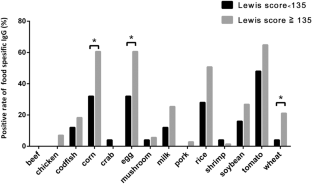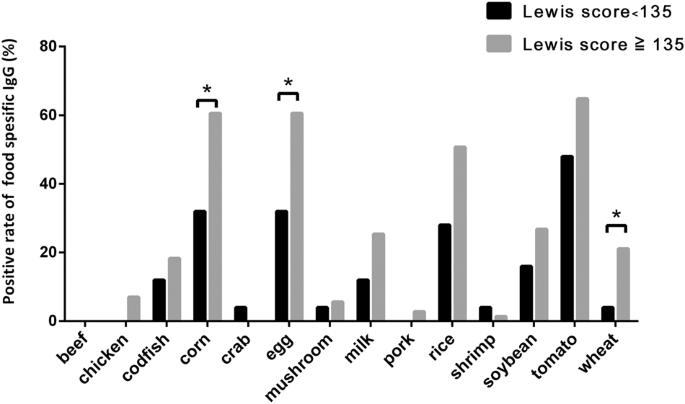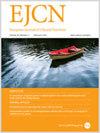Serum food specific IgG antibodies are associated with small bowel inflammation in patients with Crohn’s disease
IF 3.3
3区 医学
Q2 NUTRITION & DIETETICS
引用次数: 0
Abstract
Food antigens are thought to play a vital role in the initiation and perpetuation of Crohn’s disease (CD). The main purpose of this study was to evaluate the potential association of serum food specific IgG antibodies and small bowel (SB) inflammation in CD patients. We conducted a prospective observational study with 96 CD patients. Demographic, disease-related data and inflammatory parameters were collected. Serum food IgG antibodies were measured using enzyme-linked immunosorbent assay (ELISA). Capsule endoscopy was performed to detect SB inflammation quantified by the Lewis Score. Seventy-eight of (81.3%) CD patients were detected positive for at least one food-specific antibody. The five most prevalent food antibodies in CD patients were tomato, egg, corn, rice, and soybean. Patients with SB inflammation had a higher positive rate of food IgG antibodies (P = 0.010) and more IgG-positive food items (P = 0.010) than those without. Specifically, patients with SB inflammation were more likely to have positive food-specific IgG against egg (P = 0.014), corn (P = 0.014), and wheat (P = 0.048). Additionally, the number of positive food IgGs ≥ 3 and elevated ESR were independently associated with concurrent SB inflammation (P = 0.015 and P = 0.013, respectively). Our study confirmed that CD patients with SB inflammation had a higher positive rate of food IgG antibodies and more IgG-positive food items. The number of food positive IgGs ≥ 3 and elevated ESR were independently associated with concurrent SB inflammation.


克罗恩病患者的血清食物特异性IgG抗体与小肠炎症有关。
背景/目的:食物抗原被认为在克罗恩病(CD)的发生和延续中起着至关重要的作用。本研究的主要目的是评估CD患者血清食物特异性IgG抗体与小肠炎症的潜在相关性。方法:我们对96例CD患者进行了前瞻性观察研究。收集人口统计学、疾病相关数据和炎症参数。采用酶联免疫吸附试验(ELISA)测定血清食物IgG抗体。结果:78例(81.3%)CD患者至少检测到一种食物特异性抗体呈阳性。CD患者中最常见的五种食物抗体是番茄、鸡蛋、玉米、大米和大豆。SB炎症患者食物IgG抗体阳性率较高(P = 0.010)及IgG阳性食品较多(P = 0.010)。特别是SB炎症患者更有可能出现针对鸡蛋的食物特异性IgG阳性(P = 0.014)、玉米(P = 0.014)和小麦(P = 0.048)。此外,食物IgG阳性的数量 ≥ 3和ESR升高与并发SB炎症独立相关(P = 0.015和P = 结论:本研究证实CD伴SB炎症患者的食物IgG抗体阳性率较高,食物IgG阳性项目较多。食物中IgG阳性的数量 ≥ 3和ESR升高与并发SB炎症独立相关。
本文章由计算机程序翻译,如有差异,请以英文原文为准。
求助全文
约1分钟内获得全文
求助全文
来源期刊
CiteScore
10.60
自引率
2.10%
发文量
189
审稿时长
3-6 weeks
期刊介绍:
The European Journal of Clinical Nutrition (EJCN) is an international, peer-reviewed journal covering all aspects of human and clinical nutrition. The journal welcomes original research, reviews, case reports and brief communications based on clinical, metabolic and epidemiological studies that describe methodologies, mechanisms, associations and benefits of nutritional interventions for clinical disease and health promotion.
Topics of interest include but are not limited to:
Nutrition and Health (including climate and ecological aspects)
Metabolism & Metabolomics
Genomics and personalized strategies in nutrition
Nutrition during the early life cycle
Health issues and nutrition in the elderly
Phenotyping in clinical nutrition
Nutrition in acute and chronic diseases
The double burden of ''malnutrition'': Under-nutrition and Obesity
Prevention of Non Communicable Diseases (NCD)

 求助内容:
求助内容: 应助结果提醒方式:
应助结果提醒方式:


